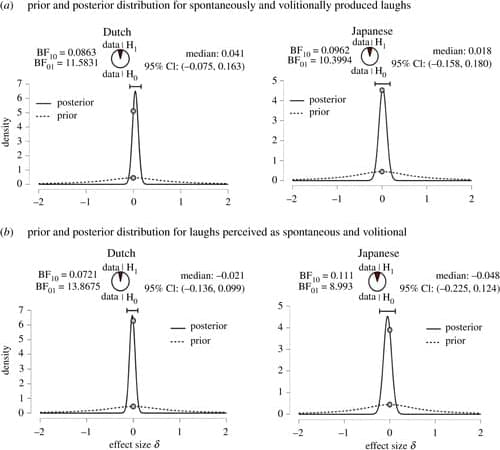Laughter is a ubiquitous social signal. Recent work has highlighted distinctions between spontaneous and volitional laughter, which differ in terms of both production mechanisms and perceptual features. Here, we test listeners’ ability to infer group identity from volitional and spontaneous laughter, as well as the perceived positivity of these laughs across cultures. Dutch (n = 273) and Japanese (n = 131) participants listened to decontextualized laughter clips and judged (i) whether the laughing person was from their cultural in-group or an out-group; and (ii) whether they thought the laughter was produced spontaneously or volitionally. They also rated the positivity of each laughter clip. Using frequentist and Bayesian analyses, we show that listeners were able to infer group membership from both spontaneous and volitional laughter, and that performance was equivalent for both types of laughter. Spontaneous laughter was rated as more positive than volitional laughter across the two cultures, and in-group laughs were perceived as more positive than out-group laughs by Dutch but not Japanese listeners. Our results demonstrate that both spontaneous and volitional laughter can be used by listeners to infer laughers’ cultural group identity.
This article is part of the theme issue ‘Voice modulation: from origin and mechanism to social impact (Part II)’.
Laughter is a frequently occurring and socially potent nonverbal vocalization, which is frequently used to signal affiliation, reward or cooperative intent, and often helps to maintain and strengthen social bonds [1,2]. A key distinction is whether laughs are spontaneous or volitional [3,4]. Spontaneous and volitional laughs are thought to be generated by different vocal production mechanisms. We often laugh spontaneously with little volitional control, which is thought to typically reflect an internal emotional state. Yet laughter can also be produced with volitional modulation of vocal output, which is more likely to express polite agreement in conversation [5,6]. Recent research has shown that listeners’ ability to differentiate individual speakers is impaired for spontaneous, as compared to volitional, laughter [7,8].
